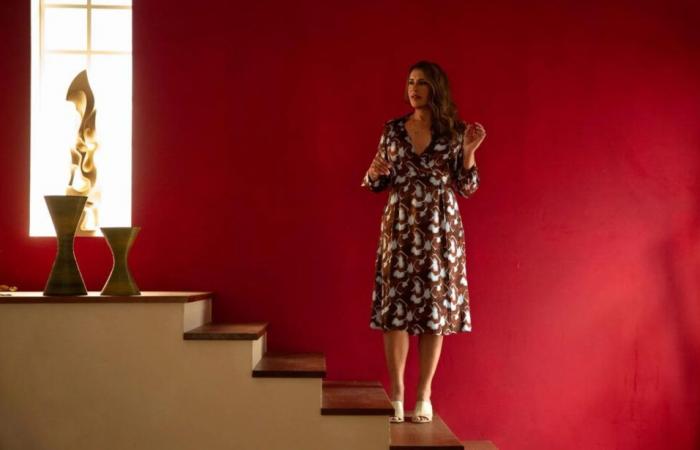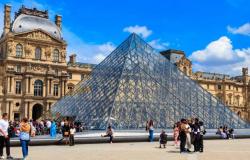The scathing “Emilia Pérez” by Jacques Audiard has just won four awards at the Golden Globes in Hollywood: prize for best comedy, best foreign film, best supporting actress for Zoe Saldana, but also best song. Co-signed by the duo Clément Ducol and Camille, “El Mal” is part of an ambitious soundtrack whose inventiveness and poetry are no stranger to the success of the film. Meeting with the sound architect who worked behind the scenes: the musical producer and “supervisor” Pierre-Marie Dru (Pigalle Production).
Marianne : Your function, in the long chain of skills at work in the production of cinema films or series, is commonly called “musical supervision”. But we imagine that your work goes far beyond simple supervision…
Pierre-Marie Dru : It is a job with variable geometry. I tend to think that what I practice is akin to a form of musical architecture – a term which, in my case, is all the more relevant since I studied architecture in Paris. , with the Franco-Peruvian Henri Ciriani as a mentor, before returning to my first passion, the one that had thrilled me since adolescence, music…
In fact, this profession of architect through music can take several forms: at a minimum, it will involve offering a choice of wallpaper for two or three walls in an already solid and partly decorated house; but it could also be a matter, in the most demanding and artistically ambitious projects, of completely thinking through the plans of the building. I have experienced this optimum version of my job twice in recent years: with Annette by Leos Carax, then with Emilia Perez by Jacques Audiard.
What was the first film on which you were given this music work?
Ouaga Sagaa lovely film by a Burkinabe director, Dani Kouyaté, shot in Ouagadougou and released in theaters in 2004. They came to me for my knowledge of West African music – I who, for many years, had been passing my days listening to records, in very varied styles, rock, folk, soul, world music…
2004 therefore, first film. Then it took me six more years to put my name in a second credit, Sound of Noisea Swedish feature film – which was also my first collaboration with a French musician that I really like, Fred Avril.
In this profession where everything is constantly being invented, it is not easy to find your place, but music for images has always been my great passion, and therefore I had faith. I was so shocked when I saw the films of Pedro Almodóvar, Emir Kusturica or, a little later, Paul Thomas Anderson – to name three cinematographic universes where the music literally bursts through the screen – that I never imagined do something else with my life.
READ ALSO: The indiscretions of “Marianne”: why can’t we find the music of “Emilia Perez” on the platforms?
And to prepare myself for this role that I dreamed of, I also took the time to learn the guitar, singing, and how to use the tool that is the benchmark in studio recording, the ProTools software. I needed to understand how all these artistic elements work so that I can then be a quality interlocutor when I meet musicians, creators, sound engineers.
With success, since you are now, very regularly, in the studio with artists like the Sparks, to Annette by Leos Carax, but also Avril, who you just mentioned, or the electro artist Rone for The Olympicsby Jacques Audiard, already, in 2021…
The joy of this job is working with very different people, themselves quite “hybrid” and curious about many things. In the same day, I can go from a children's cartoon to a very cutting-edge art film or to a series for an American platform. We dive into worlds, into visions, into imaginations, and my role is to try to enrich the project by bringing originality, strength, but also finesse, I hope.
It's more rewarding to do this job today, it seems to me, than 10 or 15 years ago, a time when everyone did a bit of the same thing, with editors who all liked the same style of sounds and all had the same references. In recent years, I believe that the game has reopened, regardless of the age of the editors. Cinema is once again more creative, particularly in terms of audacity and inventiveness regarding the music, and the beauty of the soundtrack written by Camille and Clément Ducol for Emilia Perez attests to this, I believe.
So you collaborated for the first time with Jacques Audiard for his film The Olympicsin 2021. Had he already spoken to you about his next project?
Yes, and at the time, Jacques had already considered a number of composers for the music, which was at the heart of his idea. In his head, the Emilia Pérez project was not going to be a film, but an opera: he saw it as a kind ofThreepenny Opera – and he had also spoken about it with Damon Albarn and with Chilly Gonzales.
READ ALSO: “Emilia Perez” by Jacques Audiard: a clumsy musical comedy about a drug trafficker becoming… a woman
He had also met the composer and musician Clément Ducol, who told him: “A story set in Mexico, with songs in Spanish? I absolutely have to introduce you to my partner, Camille, who speaks Spanish very well…” Quickly, their work of discussion, research, and already writing begins: they meet in particular in Dordogne, at Clément and Camille's house, where they will share a sort of artists' residence.
Jacques Audiard operates like a sculptor: he sculpts stories, he puts scalpel strokes everywhere, in his filming, in his editing…
At this point, it is obvious that Jacques “thinks” things musically. He says that with this sound material emerging little by little, he will be able to go further under the skin. He wants and assumes a very experimental side, he wants to try things. And so initially, we talk about “podcast”, we talk about “unidentified sound object”…
He tells us that if there is going to be a film in the end, then it will be a transgender film, but in every way. And to think this, he needed to go through these stages of research, which will eventually lead to a kind of joint document, a “sound work in progress”, with songs and narration. A document which will then serve as a basis for reflection for the entire team, and for all the professions involved in working on the film, from set designers to choreographers, and even the film editor, Juliette Welfling.
Did Jacques Audiard, director but also “gang leader”, go through moments of worry about finalizing the rather crazy project he had you involved in?
Jacques goes surfing. His approach is a lot of intuition, but also so much work and talent… He's a filmmaker who senses people, and who senses where things can go. This intuition gives him a lot of freedom. As a result, in this very creative climate, there are moments of vision, great flashes…
But in fact, it was particularly “sporty”, we had to hang on… For example, we must understand that the actresses in the film worked on their playback for a long time by listening to the “demo” tapes recorded by Camille, that is to say say non-final versions of the songs. Then they put their own voice on working recordings, in more personal interpretations, and therefore a little offset from Camille's voice and placement.
READ ALSO: “The Olympiads”, “A Prophet”, “Sur mes lips”…: We have classified the films of Jacques Audiard
In short, for a very long time, we moved forward, walking, without ever being completely sure of our arrival point. In total, this four-year long adventure ended in a frantic sprint, with the film being selected for the Cannes Film Festival in May 2025. However, the editing of the film was only completed on February 10, and on that date , we only had a month left to produce the final recordings of the music: a pop group, symphonic with brass and woodwinds, a lyrical ensemble, Mexican choirs, all in an extremely short time.
The story you give of all these successive stages ends up making you dizzy: you almost have the impression that there was a gigantic project to carry out, but that you did not have the plans in front of you…
This is precisely the beauty and madness of this film! Jacques took us with him on this adventure which was undoubtedly unreasonable. (laughs). For me, the best way to talk about him is to say that he works like a sculptor: he sculpts stories, he launches something, a first draft on a scenario, and then, he won't stop to make scalpel blows in its story, in its preparation, in its filming, in its editing, in its post-production. It takes a lot of time, but in the end, it's as polished as ever. And today, we all have this long-term work before our eyes, and this film is unique.
***
The film's soundtrack has just been released, on double vinyl, on CD, and on all platforms (at Masterworks/Sony).






